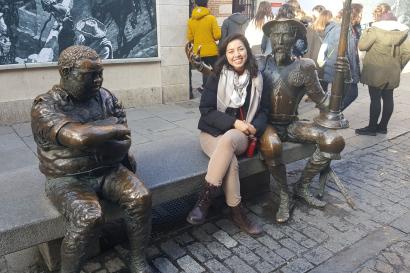Well, I have completed my first finals in a university outside of the United States! And this past finals season was tough. The popular myth about studying abroad is that you get to have a “free semester” to travel the world and discover new places. While it is much easier and accessible to travel, you still have school. With IES, no classes were scheduled on Fridays, but there was always the possibility of having class on Friday with the engineering university, which hinders your ability to travel.
The Spanish University system is also quite different than in the United States. To get into university, all Spanish students take a significant test called the Selectividad, similar to the SAT or ACT in the United States, measuring the taker’s abilities in subjects like history, language and literature, as well as a foreign language section and the choice of two to four specialty subjects that determine the career path of each student. Unlike in the United States, the test scores received are the only factor upon which students are selected into university. There are only a certain number of spots in each “major” such as biomedical or mechanical engineering, and the scores determine whether or not you are admitted under that major. Because of this, most Spanish students also have a secondary major in mind, and some are on a waiting list in case some students drop or also switch majors. All the same, much like in the United States, even after performing well in secundaria, or high school, university is still a higher level of education meant to challenge the students. Grading in Spain is out of ten, and no curving of tests or grades occurs, but, a score of five is an equivalent to a C grade in the United States. In order to pass, students must truly understand the material.
The schools a student chooses are most commonly in the same city in which they were raised, and often, students remain living with their parents in that city until they complete university and are able to move out on their own. It is more uncommon to move to a different region of the country, called Autonomous Communities, than it is to stay, which I found very different from the United States. I myself am an out-of-state student at my university. Culturally in Spain, it is more common to remain near family than it is to move, less so than in America. However, I believe a part of it is the ease of travel and exploration within Europe, whereas in the U.S., it is much more time consuming and expensive to travel around the country, let alone countries nearby. I was motivated to attend school outside of my state to see and experience a different part of the country.
Something interesting to note, however, is that while some private institutions exist, the majority of Spanish students attend institutions that are free, paid for by the government. This motivates students to continue their education to the highest form. The admission system results in competitive classes and high performing students. However, it is common for Spanish students to look for graduate school options outside of the country, and many move to other parts of the world because of opportunities for work they cannot find in Spain. It is interesting, considering many American students may rack up thousands in debt, and depending on what they decide to do as a career, may or may not find a job right out of college.
The two systems are different yet similar in many ways and I found it a bit difficult to adapt at first, having lived my entire life under only one. I studied a lot, even though I found very few study spaces open on weekends, hint hint Madrid. However, I am glad to have experienced a new method and seen a new perspective on education.

Juliana Trujillo
Juliana Trujillo is just a girl from Colorado ready to do big things. A love for learning, family support, and food inspired her ambitions to study abroad. She is a Bioengineering major with a Chemistry minor with a passion for promoting STEM equity and equality. In her free time, Juliana loves to read, be outdoors, or read outdoors in addition to spending time with friends and family.








